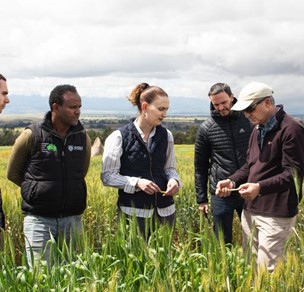Norwich, United Kingdom
October 27, 2023

An international collaboration, including researchers at John Innes Centre, The Sainsbury Laboratory and GetGenome have announced the Wheat Disease Early Warning Advisory System (Wheat DEWAS), to strengthen crop resilience against devastating wheat diseases. Thanks to a generous $7.3 million grant, Wheat DEWAS will bolster the protection of wheat productivity in vulnerable regions of East Africa and South Asia.
The project consists of six interconnected work packages, focusing on preventing outbreaks from novel pathogen strains. By bringing together and expanding existing successful systems, the team aims to provide governments with near-real-time risk forecasts and actionable advice for farmers. This invaluable information will enable proactive responses to transboundary wheat diseases, ensuring long-term sustainable crop productivity.
Rust and blast diseases, the major fungal pathogens threatening wheat, will be the primary targets. Rust diseases, identified by their rust-like appearance on infected plants, can cause significant crop yield reductions. These pathogens’ spores can travel across borders and continents, resulting in devastating epidemics. Wheat blast, caused by the fungus Magnaporthe oryzae pathotype Triticum, is another rising threat, causing rapid crop deterioration and leaving farmers with limited time to take preventive measures.
Through the expansion of the MARPLE diagnostics network in at-risk countries, researchers will provide real-time disease diagnostics and monitoring capacity for wheat rusts. This groundbreaking approach equips researchers in the field with accessible, mobile, and real-time genotyping methodologies, enabling them to contribute critical information to DEWAS’s early warning systems.
Having pioneered MARPLE diagnostics in collaboration with colleagues at CIMMYT and the Ethiopian Institute of Agricultural Research, Professor Diane Saunders, the lead of DEWAS Pathogen Diagnostics, is once again looking forward to working with an international team of partners.
“It is fantastic to see the breadth of international collaboration in DEWAS. We are delighted to be part of this phenomenal team, working together to deploy the latest innovations in disease diagnostics, surveillance, and disease forecasting in the locations where they can have the greatest impact in tackling two of the most devastating threats to wheat production.”
Led by David Hodson from CIMMYT and Maricelis Acevedo from Cornell University, this ambitious project brings together a global team of experts. Professor Sophien Kamoun is particularly delighted to expand collaboration with CIMMYT and African scientists, developing and expanding the cutting-edge platforms for genomic surveillance of wheat pathogen.
“We are thrilled about expanding our collaboration with CIMMYT and African scientists to establish platforms for genomic surveillance of wheat pathogens and share the findings with the community using open science principles.”
The combination of rapid identification of emerging variants together with pathotyping to assess the variants’ potential to impact wheat production will inform the generation of a list of Variants of Concern. This valuable data will be shared with project partners and contribute to the deployment of effective disease management strategies.
Wheat DEWAS is designed to help safeguard wheat productivity and advance sustainable agricultural practices. The groundbreaking approach enhances crop disease management through the utilization of cutting-edge genomics technology, comprehensive data collection, and seamless integration, all accomplished by a diverse multinational team of collaborators.